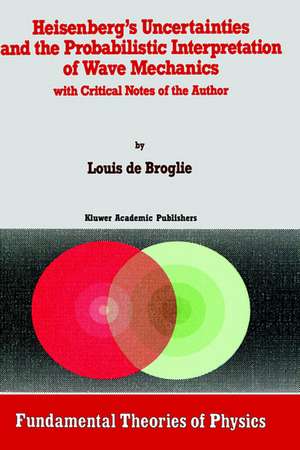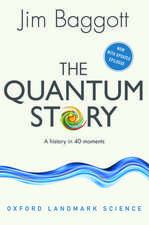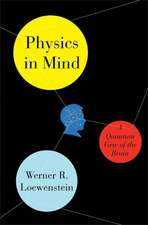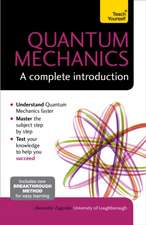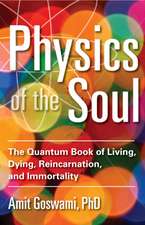Heisenberg’s Uncertainties and the Probabilistic Interpretation of Wave Mechanics: with Critical Notes of the Author: Fundamental Theories of Physics, cartea 40
Cuvânt înainte de P. Barut Autor Louis de Broglie Prefață de G. Lochak Traducere de Alwyn van der Merween Limba Engleză Hardback – 29 noi 1990
Din seria Fundamental Theories of Physics
- 20%
 Preț: 1002.39 lei
Preț: 1002.39 lei -
 Preț: 426.56 lei
Preț: 426.56 lei - 20%
 Preț: 819.51 lei
Preț: 819.51 lei - 18%
 Preț: 779.26 lei
Preț: 779.26 lei - 18%
 Preț: 955.25 lei
Preț: 955.25 lei - 18%
 Preț: 950.52 lei
Preț: 950.52 lei - 24%
 Preț: 794.91 lei
Preț: 794.91 lei - 18%
 Preț: 948.47 lei
Preț: 948.47 lei - 15%
 Preț: 589.80 lei
Preț: 589.80 lei - 18%
 Preț: 1229.73 lei
Preț: 1229.73 lei - 15%
 Preț: 587.83 lei
Preț: 587.83 lei - 18%
 Preț: 1236.06 lei
Preț: 1236.06 lei - 18%
 Preț: 946.87 lei
Preț: 946.87 lei -
 Preț: 394.87 lei
Preț: 394.87 lei - 18%
 Preț: 954.93 lei
Preț: 954.93 lei - 18%
 Preț: 1241.10 lei
Preț: 1241.10 lei - 18%
 Preț: 954.93 lei
Preț: 954.93 lei - 18%
 Preț: 953.35 lei
Preț: 953.35 lei - 18%
 Preț: 948.92 lei
Preț: 948.92 lei - 15%
 Preț: 648.05 lei
Preț: 648.05 lei - 18%
 Preț: 1232.09 lei
Preț: 1232.09 lei - 18%
 Preț: 996.78 lei
Preț: 996.78 lei - 18%
 Preț: 946.41 lei
Preț: 946.41 lei - 15%
 Preț: 640.24 lei
Preț: 640.24 lei - 15%
 Preț: 636.80 lei
Preț: 636.80 lei -
 Preț: 391.79 lei
Preț: 391.79 lei - 18%
 Preț: 780.19 lei
Preț: 780.19 lei -
 Preț: 391.79 lei
Preț: 391.79 lei - 15%
 Preț: 649.06 lei
Preț: 649.06 lei -
 Preț: 397.76 lei
Preț: 397.76 lei - 24%
 Preț: 586.71 lei
Preț: 586.71 lei - 15%
 Preț: 644.95 lei
Preț: 644.95 lei - 18%
 Preț: 1228.15 lei
Preț: 1228.15 lei
Preț: 796.92 lei
Preț vechi: 1048.57 lei
-24% Nou
Puncte Express: 1195
Preț estimativ în valută:
152.51€ • 165.60$ • 128.11£
152.51€ • 165.60$ • 128.11£
Carte tipărită la comandă
Livrare economică 18-24 aprilie
Preluare comenzi: 021 569.72.76
Specificații
ISBN-13: 9780792309291
ISBN-10: 0792309294
Pagini: 302
Ilustrații: 1
Dimensiuni: 156 x 234 x 21 mm
Greutate: 0.67 kg
Ediția:1990
Editura: SPRINGER NETHERLANDS
Colecția Springer
Seria Fundamental Theories of Physics
Locul publicării:Dordrecht, Netherlands
ISBN-10: 0792309294
Pagini: 302
Ilustrații: 1
Dimensiuni: 156 x 234 x 21 mm
Greutate: 0.67 kg
Ediția:1990
Editura: SPRINGER NETHERLANDS
Colecția Springer
Seria Fundamental Theories of Physics
Locul publicării:Dordrecht, Netherlands
Public țintă
ResearchDescriere
LOUIS
DE
BROGLIE
AND
THE
SINGLE
QUANTUM
PARTICLE
By
A.
O.
Barut
We
have
abundant
evidence
and
testimony
that
Louis
de
Broglie
deeply
cared
about
the
foundations,
the
meaning,
and
our
understanding
of
quantum
theory
in
general
and
of
wave
mechanics
in
particular.
So,
too,
did
Erwin
Schrodinger,
along
with
Einstein,
Bohr,
Dirac,
and
Heisenberg.
For
de
Broglie
and
Schrodinger
this
preoccupation
meant
not
simply
the
acceptance
of
a
novel
set
of
rules,
but
a
constant
struggle
and
a
search
for
complete
clarity
about
the
way
in
which
the
new
theory
fits
into
the
great
classical
traditions
of
an
objective
physical
world
view.
We
may
call
this
a
striving
for
"physical
rigor,"
rigor
in
reasoning,
or
intellectual
rigor.
There
is
not
only
mathematical
rigor
inside
an
axiomatic
system
with
which
everybody
agrees,
but
there
is,
and
there
should
be,
rigor
also
in
our
concepts
and
methods.
To
this
kind
of
rigor
belongs
the
unity,
the
economy
and
simplicity,
and
the
consistency
of
physical
theories;
naturally
along
with
as
complete
and
as
clear
an
understanding
of
phenomena
as
possible.
No
loose
ends,
no
proliferation
of
poorly
tested
and
phenomenological
entities,
no
bending
of
logic
and
compromise,
and
no
handwaiving
arguments
can
be
tolerated.
Unfortunately
this
kind
of
rigor
seems
to
be
missing
in
today's
forefront
of
fundamental
physical
theories,
viz.
,
particle
or
high-energy
physics.
Cuprins
One
(1950–1951)
On
Heisenberg’s
Uncertainties
and
the
Probabilistic
Interpretation
of
Wave
Mechanics.-
1.
Principles
of
Wave
Mechanics.-
1.
Classical
Mechanics
of
the
Point
Mass.
Theory
of
Jacobi.-
2.
Wave
Propagation
in
an
Isotropic
Medium.-
3.
Transition
from
Classical
Mechanics
to
Wave
Mechanics.-
4.
General
Equation
for
the
Wave
Mechanics
of
a
Point
Mass.-
5.
Automatic
Procedure
for
Obtaining
the
Wave
Equation.-
2.
Probabilistic
Interpretation
of
Wave
Mechanics.-
1.
Interpretation
of
the
?
Wave.-
2.
Principle
of
Interference.-
3.
Precise
Statement
of
the
Principle
of
Interference.
Probability
Fluid.-
4.
The
Uncertainty
Relations
of
Heisenberg.-
5.
The
Principle
of
Spectral
Decomposition
(Born).-
6.
New
Ideas
Resulting
from
the
Preceding
Conceptions.-
7.
Return
of
Wave
Mechanics
to
Classical
Mechanics..-
The
Theorem
of
Ehrenfest.
Group
Velocity.-
3.
Wave
Mechanics
of
Systems
of
Particles.-
1.
Old
Dynamics
of
Systems
of
Point
Masses.-
2.
Wave
Mechanics
of
Systems
of
Particles.-
3.
Interpretation
of
Wave
Mechanics
for
a
System
of
Particles.-
4.
General
Formalism
of
Wave
Mechanics.-
1.
New
Conception
of
the
Quantities
Attached
to
a
Particle
(or
to
a
System).-
2.
Eigenvalues
and
Eigenfunctions
of
a
Linear
Hermitian
Operator.-
3.
Continuous
Spectrum
of
the
Free-Particle
Hamiltonian.
Dirac’s
Delta
Function.-
5.
General
Principles
of
the
Probabilistic
Interpretation
of
Wave
Mechanics.-
1.
General
Ideas.-
2.
The
Algebraic
Matrices
and
Their
Properties.-
3.
Operators
and
Matrices
in
Wave
Mechanics.-
4.
Mean
Values
and
Dispersions
in
Wave
Mechanics.-
5.
First
Integrals
in
Wave
Mechanics.-
6.
Angular
Momentum
in
Wave
Mechanics.-
6.
Theory
of
the
Commutation
of
Operators
in
Wave
Mechanics.-
1.
General
Theorems.-
2.
Corollaries
of
the
Foregoing
Theorems.-
3.
Simultaneous
Measurement
of
Two
Quantities
in
Wave
Mechanics.-
4.
Examples
of
Quantities
That
Are
Not
Simultaneously
Measurable.
Distinction
Between
Two
Kinds
of
Non-Commutation.-
7.
Physical
Impossibility
of
Simultaneously
Measuring
Canonically
Conjugate
Quantities.-
1.
Necessity
to
Examine
the
Impossibility
of
Simultaneously
and
Precisely
Measuring
Two
Canonically
Conjugate
Quantities.-
2.
The
Heisenberg
Microscope.-
3.
Measurement
of
the
Speed
of
an
Electron
by
Means
of
the
Doppler
Effect.-
4.
Passage
of
a
Particle
through
a
Rectangular
Aperture.-
5.
Important
Remark
on
the
Measurement
of
Speed.-
6.
The
Case
of
Two
Operators
with
a
Nonzero
Commutator.-
7.
Bohr’s
Complementarity.-
8.
Bohr’s
Calculation
for
Young’s
Slits.-
8.
Precise
Form
of
the
Uncertainty
Relations.-
1.
Theorem
About
the
Dispersion
of
Non-Commuting
Quantities.-
2.
Optimal
Nature
of
the
Gaussian
Wave
Packet.-
3.
Comparison
of
the
Theorem
on
Dispersions
with
the
Qualitative
Uncertainty
Relations
of
Heisenberg
(Pauli
and
Robertson).-
4.
Various
Considerations
about
Uncertainties.
Sharp-edged
Uncertainties.-
9.
Heisenberg’s
Fourth
Uncertainty
Relation.-
1.
The
Absence
of
Symmetry
between
Space
and
Time
in
Wave
Mechanics.-
2.
Correct
Formulation
of
the
Fourth
Uncertainty
Relation.-
3.
Illustration
of
the
Preceding
Definition.-
4.
Various
Remarks
about
the
Fourth
Uncertainty
Relation.-
5.
Method
of
Variation
of
Constants.
Transition
Probability.-
6.
Transition
Probabilities.-
7.
Uncertainty
Relations
and
Relativity
Theory.-
8.
Formulas
of
Mandelstam
and
Tamm.-
10.
Examination
of
Some
Difficult
Points
in
Wave
Mechanics.-
1.
Reduction
of
the
Probability
Packet
by
Measurement.-
2.
Impossibility
of
Discovering
the
Anterior
State
of
a
Measurement
from
its
Posterior
State.
Effacement
of
Phases
by
Measurement.-
3.
Possibility
of
Discovering
the
Past,
Starting
from
a
Measurement
Made
at
a
Given
Instant
(Postdiction).-
4.
Interference
of
Probabilities.-
5.
Some
Consequences
of
the
Disappearance
of
the
Trajectory
Concept.-
6.
Discussions
Concerning
“Correlated”
Systems.-
7.
Complementary
Remarks
on
the
Einstein-Bohr
Controversy.-
Two
(1951–1952)
On
the
Probabilistic
Interpretation
of
Wave
Mechanics
and
Various
Related
Questions.-
11.
Summary
of
Some
General
Concepts
of
Probability
Calculus.-
1.
Probability
Laws
for
One
Variable.
Distribution
Function.-
2.
Probability
Laws
for
Two
Variables.-
3.
Very
Important
Remark
Concerning
the
Foregoing
Results.-
12.
Recalling
the
General
Concepts
of
Wave
Mechanics.-
1.
The
Interference
Principle.
Theory
of
the
Pilot
Wave.-
13.
Introduction
of
the
Characteristic
Function
into
the
Probability
Formalism
of
Wave
Mechanics.-
1.
Characteristic
Function
for
a
Single
Quantity.-
2.
Characteristic
Function
for
Two
Commuting
Quantities.-
3.
Correlation
Coefficient.
Marginal
Laws.-
4.
General
Theorems
of
Wave
Mechanics
Considered
from
the
Characteristic-Function
Point
of
View.-
5.
Case
of
Two
Noncommuting
Quantities.-
(a)
Reminder
About
the
Reduction
of
the
Probability
Packet
by
Measurement.-
(b)
Interference
of
Probabilities.-
(c)
The
Distribution
Function
?(x,?x)
of
Wigner
and
Bass.-
(d)
The
Wigner-Bass
Density
?(x,?x)
and
the
Hydrodynamic
Interpretation
of
Wave
Mechanics.-
(e)
Yvon’s
Theory.-
14.
Theory
of
Mixtures
and
von
Neumann’s
Theory
of
Measurement.-
1.
Mixtures
and
Pure
Cases.-
2.
Von
Neumann’s
Statistical
Matrix
for
a
Pure
Case.-
3.
The
Statistical
Matrix
for
a
Mixture
of
Pure
Cases.-
4.
Irreducibility
of
Pure
Cases.-
5.
Impossibility
of
Reducing
the
Laws
of
Wave
Mechanics
to
a
Hidden
Determinism
(von
Neumann).-
15.
Measurement
Theory
in
Wave
Mechanics.-
1.
Generalities.-
2.
Statistics
of
Two
Interacting
Systems.-
3.
Correlation
Coefficients
in
the
Interaction
between
Two
Quantum
Systems.-
4.
Measurement
of
a
Quantity.-
5.
Example
of
a
Measuring
Experiment.-
6.
Diverse
Remarks
on
Measurement.-
7.
Thermodynamical
Considerations
(von
Neumann).-
8.
Reversible
and
Irreversible
Evolutions.-
9.
The
Statistical
Matrix
P0.-
16.
The
Role
of
Time
in
Wave
Mechanics.-
1.
Retrodiction
According
to
Costa
de
Beauregard.-
2.
Special
Role
of
Time
in
Quantum
Mechanics.
The
Fourth
Uncertainty
Relation.-
3.
Correct
Statement
of
the
Fourth
Uncertainty
Relation.-
4.
The
Fourth
Uncertainty
Relation
and
Perturbation
Theory.-
5.
The
Operators
H
and
(h/2?i)?/?t.-
6.
Application
of
the
Formalism
of
Arnous
to
the
Operators
Acting
on
Time.-
7.
Multitemporal
Formalism.
Multiplicity
Curves
in
Spacetime.-
Works
of
Louis
de
Broglie.
Recenzii
`Here
is
a
truly
essential
book
for
scholars
interested
in
thefoundations
of
quantum
physics.
Heisenberg's Uncertaintiesis a unique work of landmark importance...
Heisenberg's Uncertainties and the Probabilistic Interpretation of Wave Mechanicsis a translation by Alwyn van der Merwe of the Frenchoriginal (published in 1982). In this genre, too, the book representsa superb piece of work, wherein notably the redundancies of the Frenchtext, not surprisingly for a book based on lecture notes, have beennicely smoothed out. The result is a monograph of enhanced readabilityand, to be sure, an outcome which at the same time sacrifices none ofthe nuances and subtleties of de Broglie's reasoning.'
Foundations of Physics, 23 No. 7, 1993
Heisenberg's Uncertaintiesis a unique work of landmark importance...
Heisenberg's Uncertainties and the Probabilistic Interpretation of Wave Mechanicsis a translation by Alwyn van der Merwe of the Frenchoriginal (published in 1982). In this genre, too, the book representsa superb piece of work, wherein notably the redundancies of the Frenchtext, not surprisingly for a book based on lecture notes, have beennicely smoothed out. The result is a monograph of enhanced readabilityand, to be sure, an outcome which at the same time sacrifices none ofthe nuances and subtleties of de Broglie's reasoning.'
Foundations of Physics, 23 No. 7, 1993
